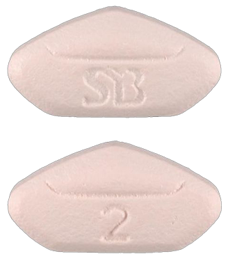Million-Person Study Shows No Link Between Pioglitazone and Bladder Cancer
An extremely large database study across more than one million people found no increased risk of bladder cancer with the diabetes drug pioglitazone.
Rosiglitazone (Avandia) 2 mg oral tablet

An extremely large database study across more than a million people found no increased risk of bladder cancer with the diabetes drug pioglitazone. The drug, along with similar agent rosiglitazone, had been implicated as potentially increasing the risk of bladder cancer in previous work.
The thiazolidinediones (TZDs) pioglitazone and rosiglitazone act as PPAR-gamma agonists in the treatment of type 2 diabetes. A 2005 randomized study found a non-significant increase in bladder cancer risk with the drugs, resulting in the US Food and Drug Administration’s request for a long-term safety review; an interim analysis of that trial did show an increased risk of bladder cancer, though other studies have yielded contradictory results.
The new study, led by Daniel Levin, MD, of the University of Dundee in the United Kingdom, aimed to address limitations of previous work by measuring pioglitazone’s effects across several large cohorts. These cohorts included diabetics in British Columbia in Canada, Finland, Manchester in the United Kingdom, Rotterdam in the Netherlands, Scotland, and the UK Clinical Practice Research Datalink. In total, the study included 1.01 million individuals and over 5.9 million person-years of follow-up. Results were published online ahead of print on December 7 in Diabetologia.
Among the total cohort, there were 3,248 cases of incident bladder cancer. Only 117 of those, as well as 204 out of 5,262 bladder neoplasms, occurred in patients who were ever exposed to pioglitazone. This yielded a rate ratio (RR) per 100 days of cumulative exposure to the drug of 1.01 for men (95% CI, 0.97-1.06) and 1.04 for women (95% CI, 0.97-1.11). These RRs included adjustments for age, calendar year, diabetes duration, smoking status, and any ever use of pioglitazone.
There was also no association seen between rosiglitazone, the other major TZD used in diabetes treatment, and bladder cancer. This was true again in men, with an RR of 1.01 (95% CI, 0.98-1.03) and in women with an RR of 1.00 (95% CI, 0.94-1.07).
The FDA’s current recommendation on pioglitazone does include a warning that use of the drug for more than 1 year could be associated with an increased risk of bladder cancer.
“This analysis, to our knowledge, is the only one to use identical methodology across international centers involving a large number of diabetic patients,” the authors wrote. There was some variation between those centers in the relationship between TZDs and bladder cancer, emphasizing the high potential for allocation bias in some studies of this issue.
“Our large international analysis does not support a causal effect of pioglitazone on bladder cancer, thus contradicting previous studies deemed to have proven this relationship,” the authors concluded.